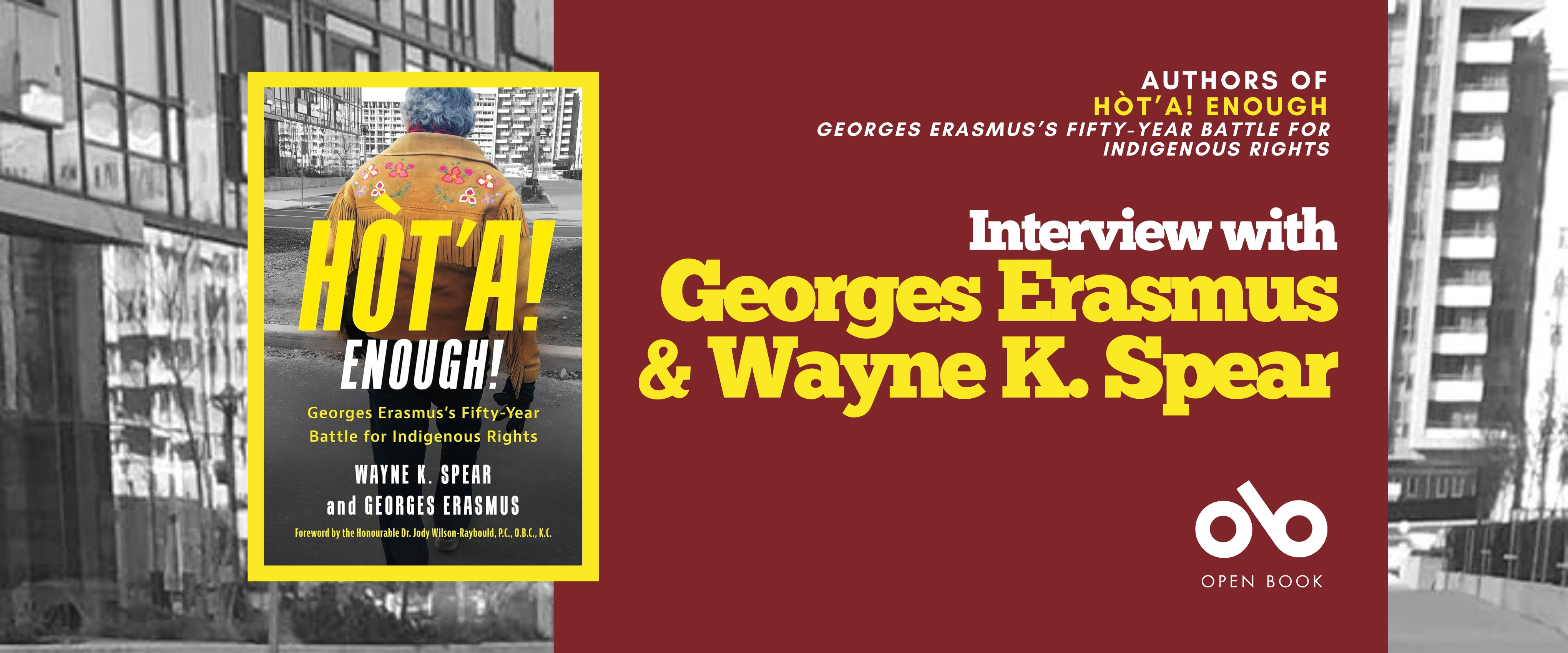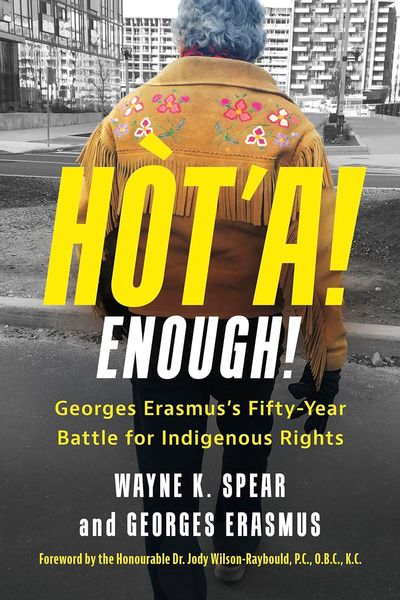Georges Erasmus's Fifty-Year Battle for Indigenous Rights is Chronicled in Hòt'a! Enough!
Over the past fifty years, there has perhaps been no more significant voice in the fight for Indigenous rights than that of Georges Erasmus, a Dene leader who has worked tirelessly to challenge governments and influence change. Erasmus has been part of some of the most important initiatives in recent decades, from the Berger Inquiry to the Canadian constitutional talks to the Oka Crisis.
This extraordinary figure has his life in politics chronicled in the new nonfiction work, Hòt'a! Enough!: Georges Erasmus's Fifty-Year Battle for Indigenous Rights (Dundurn Press). The book was authored by Erasmus and Wayne K. Spear, and follows the personal story of the titular figure, who had such an impact in his career that he was often referred to as the "Thirteenth Premier."
We're very excited to share this True Story Nonfiction interview with both authors today on Open Book, where they talk about the conception of Hota! Enough!, and the creative process behind this essential nonfiction title.
Open Book:
Tell us about your new book and how it came to be. What made you passionate about the subject matter you're exploring?
Georges Erasmus:
I was asked by Wayne to do a book on my life; to give an account of the different roles and jobs I did over my career. Personally, I had thought a number of times of doing a book and even began one many years ago which focused more on how the Dene had been colonized and telling the story of our efforts at decolonizing.
Wayne K. Spear:
Georges and I had worked together at the Aboriginal Healing Foundation. I knew his story, at least the public side of it. He’d had the good fortune to have been a national leader during some big moments in Canadian history. I knew this project would allow me to dig into fifty years of pretty momentous events. If the book was going to turn out boring, that was going to be my fault, because I could see how interesting the subject was.
OB:
Is there a question that is central to your book? And if so, is it the same question you were thinking about when you started writing or did it change during the writing process?
GA:
What was the driving reason for the many decades of effort in one area, which is to regain control of our lives as collectives and as individuals. The theme remained the same, Self Determination and Self Government over a large portion of our homelands.
WKS:
What is effective leadership? I started and ended with that question. I lay out all the perspectives of people who knew Georges, and I offer my own conclusion as well. I can tell you I’ve worked with a lot of people, and Georges has something rare and special about him, no doubt about it.
Your CanLit News
Subscribe to Open Book’s newsletter to get local book events, literary content, writing tips, and more in your inbox
OB:
What was your research process like for this book? Did you encounter anything unexpected while you were researching?
GA:
The main research was to find stories and historic material over the last 50 years to put my life story in proper sequence and context, as I had destroyed all my dairies, calendars years ago thinking I would never need them again.
WKS:
Number one, I create a timeline of events, which is a sort of narrative or plot outline. Then I do the interviews. I gather as much material as I can, from archives and newspapers and books and journal articles. I also had Georges’ personal papers. Nowadays I do most research online. Thirty, forty years ago I used an index card system, where I’d put every index card on the floor and arrange them into a narrative. These days I load every piece of data into a software program called Scrivener, and I move the pieces around to fit into that narrative, timeline structure. If it sounds tedious, it is. But once you have a very rough first draft, like a big complete chunk of clay to shape, it gets more interesting.
OB:
What do you love about writing nonfiction? What are some of the strengths of the genre, in your opinion?
WKS:
Truth really is stranger than fiction. Pick any subject, any subject at all, and you can be sure there’s a story you could never make up. I learned that a long time ago writing for the newspapers. I wrote hundreds of pieces, and every time I was looking for that weird twist of the plot, that detail that casts everything in a new light, that bit of historical irony you would never think of. You have to keep digging until you find it, but it’s always there.
OB:
What do you do if you're feeling discouraged during the writing process? Do you have a method of coping with the difficult points in your projects?
WKS:
I go for a walk. I know that I’m not going to be brilliant most of the time, so I don’t beat myself up over it. Somehow the work will get done. I will spend twenty useless hours to get to that hour or two of productivity. You have to be okay with that ratio, because writing a book is mostly awful.
OB:
Do you remember the first moment you began to consider writing this book? Was there an inciting incident that kicked off the process for you?
GA:
I found myself with free time and spending time in Toronto where Wayne lived which seemed a good time to do the book he had asked me about several years earlier.
WKS:
We started at the Aboriginal Healing Foundation chapter, at the point in the book when Georges was 50. The two of us had already worked on a book about the AHF, called Full Circle, so we had tons of material. Then we did the first chapter because I’m all about context and I wanted to get Georges’ childhood under my metaphorical belt. I don’t recall the order of the rest because the RCAP and AFN chapters came out in a burst around the same time, whereas the first two chapters were brutal to write. I know I sort of put off the section dealing with Oka, because I didn’t want to relive that time. It’s a very painful subject and I knew it was going to bring up some unpleasant feelings, and it did.
OB:
Did you write this book in the order it appears for readers? If not, how did it come together during the writing process?
GA:
No, we did not write the book the way it appears as we did different chapters at random, starting with the chapter on the AHF, or the Aboriginal Healing Foundation as we had both worked there together for many years. Then we just chose another place I worked like the AFN, or the Assembly of First Nations and worked on that chapter.
OB:
What are you working on now?
WKS:
A novel set in heaven. The main character’s been there for untold centuries. The book opens with a suicide attempt. All this fellow wants is to die, because he feels he’s done with living, but he can’t die because of course it’s heaven. He believes he’s the only person who feels this way, so he’s lonely and alienated. I started the book thinking it was about the idea that life can only be beautiful insofar as it is impermanent and changing, but I realize now it’s about empathy. As I’ve gotten older I’ve learned two things. Empathy is really important, and I’ve never been good at it. So whether the book is ultimately published or not I’ll probably have to see it through.
__________________________________________
Georges Erasmus was born in Fort Rae, Northwest Territories. He is a former President of the Indian Brotherhood of Northwest Territories (later the Dene Nation), National Chief of the Assembly of First Nations, and Chair of the Aboriginal Healing Foundation. Georges was co-chair of the Royal Commission on Aboriginal Peoples, established by the Prime Minister of Canada to examine the historical relationship between Indigenous peoples and the government. He has received the Aboriginal Achievement Award for Public Service and he is an Officer of the Order of Canada. He lives in Yellowknife.
Wayne K. Spear was born in Buffalo, New York, and grew up in Fort Erie, Ontario. A Kanien’kehá:ka (Mohawk), he has worked for more than two decades in health and education. He is the president of Spear Communications Group, an organizational development firm. His previous books include Residential Schools, with the Words and Images of Survivors and Full Circle: The Aboriginal Healing Foundation and the Unfinished Work of Hope, Healing, and Reconciliation. He lives in Toronto.





